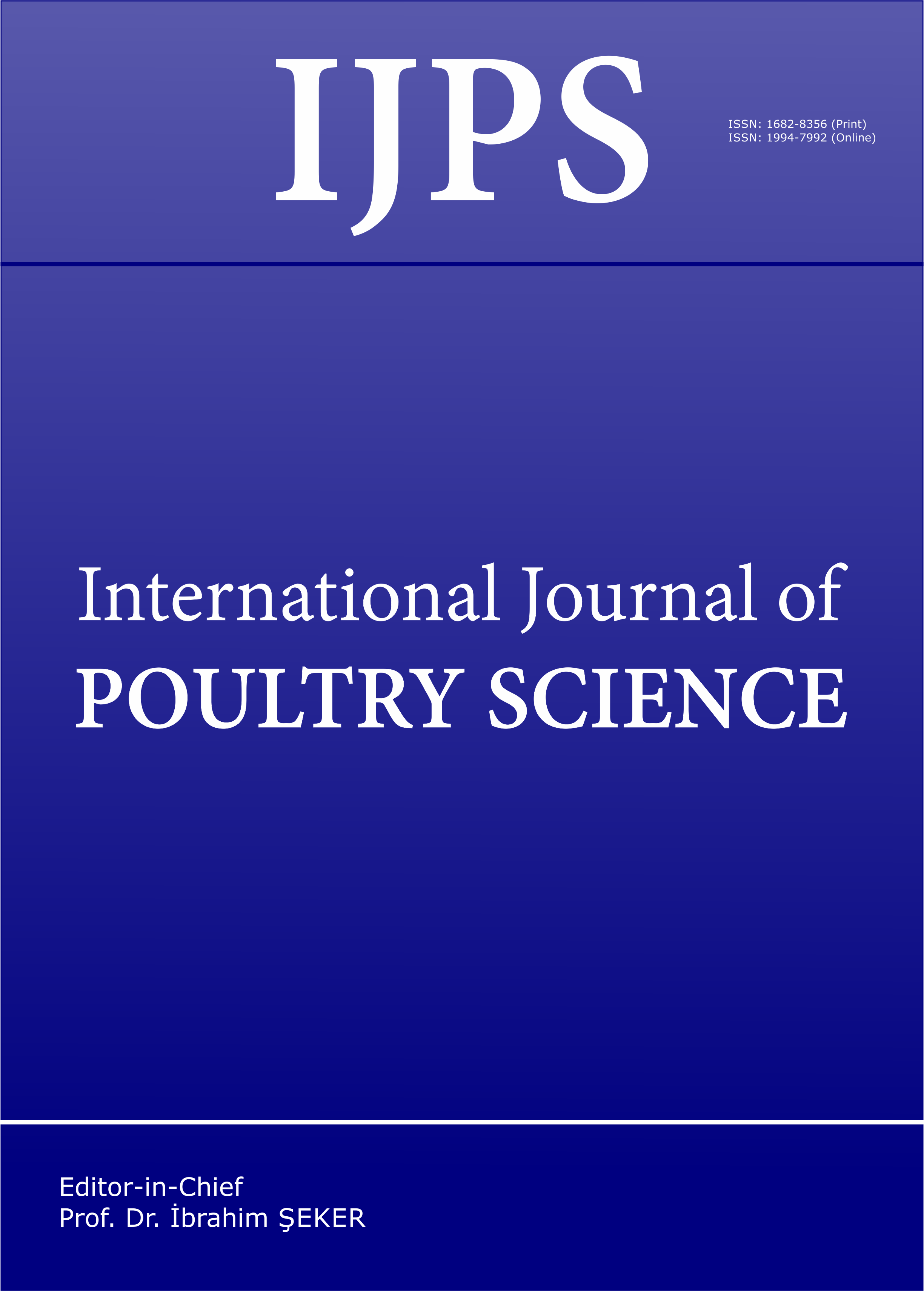Non-Invasive Methods to Predict Breast Muscle Weight in Slow-Growing Chickens
DOI:
https://doi.org/10.3923/ijps.2009.689.691Keywords:
Breast muscle, morphometry, slow-growing chicken, ultrasoundAbstract
This experiment aims to compare in vivo breast morphometric and ultrasound measurements, as well as live body weight to predict breast meat weight in slow-growing chickens. Traits included Thoracic Circumference (TC), Chest Width (CW), Keel Length (KL) and angle (KA), Live Weight (LW), thickness of muscle determined by sonography (TM) and Breast Meat Weight (BMW). Birds were then slaughtered and total breast muscles (Pectoralis major and Pectoralis minor) were dissected and weighed. A linear model including sex effect and the different predictor measurements, as covariates, were adjusted to the data. Homogeneity test of slopes between sexes showed no difference. Means of the traits were 115.58g (±19.72) for BMW, 1031 g (±163.44) for LW, 68.65o (±6.89) for KA, 26.81 cm (±1.57) for TC, 10.40 cm (±0.62) for KL, 4.67 cm (±0.47) for CW and 11.52 mm ( ±1.11) for TM. All traits were highly correlated to BMW: TC (0.85), LW (0.84), KL (0.81) and TM (0.79), except for KA (0.28) and CW (0.19). Finally, TC, LW, KL and TM appear to be valuable indicators for estimating BMW in slow-growing chickens but KA and CW remain poor predictors.
References
Andrassy-Baka, G., R. Romvari and Z. Petrasi, 1999. In vivo measurements of breast muscle in broiler chickens by means of CT. Acta Agraria Kaposvariensis, 3: 203-211.
Bentsen, H.B. and J. Katle, 1984. The use of computerised tomography in poultry breeding and science. Proceedings of 17th World Poultry Congress, (WPC'84), Helsinki, Finland, pp: 145-146.
Bentsen, H.B. and E. Sehested, 1989. Computarised tomography of chickens. Br. Poult. Sci., 30: 75-89.
Bochno, R., J. Rymkiewicz and J. Szeremeta, 2000. Regression equations for in vivo estimation of the meat content of Pekin duck carcases. Br. Poult. Sci., 41: 313-317.
Bordas, A., P. Merat, D. Sergent and F.H. Ricard, 1978. Influence of the naked neck gene Na on growth, food consumption and body composition of chicken depending on temperature. Ann. Genet. Sel. Anim., 10: 209-231.
Griffin, A.M., R.A. Renema, F.E. Robinson and M.J. Zuidhof, 2005. The influence of rearing light period and the use of broiler or broiler breeder diets on forty-two day body weight, fleshing and flock uniformity in broiler stocks. J. Applied Poult. Res., 14: 204-216.
Grunder, A., B. Pawluczuk, A. Fortin and J.R. Chambers, 1989. Heritabilities, phenotypic and genetic correlation of live and carcass traits and carcass parts in ganders. Arch. Geflugelkunde, 53: 157-162.
Komender, P. and M.A. Grashorn, 1990. Ultrasonic measurement of breast meat. Poult. Int., 29: 36-40.
Konig, T., M.A. Grashorn and W. Bessei, 1997. Estimation of breast meat yield in living broilers using B-Scan sonography. First report: Defining sites of measurement. Arch. Geflugelkunde, 61: 227-231.
Konig, T., M.A. Grashorn and W. Bessei, 1998. Estimation of breast meat yield in living broilers using B-scan sonography. Second report: Accuracy of the method. Arch. Geflugelkunde, 62: 121-125.
Lariviere, J.M., C. Michaux, V. Verleyen, C. Hanzen and P. Leroy, 2007. Comparison of non-invasive methods to predict breast muscle weight in slow-growing chickens. Proceeding of the 15th European Symposium on the Quality of Poultry Meat and 12th European Symposium on the Quality of Eggs and Egg Products, Sept. 2-5, Prague, pp: 262-263.
Lariviere, J.M., F. Farnir, J. Detilleux, C. Michaux, V. Verleyen and P. Leroy, 2009. Performance, breast morphological and carcass traits in the Ardennaise chicken breed. Int. J. Poult. Sci., 8: 452-456.
Le Bihan-Duval, E., C. Berri, F. Seigneurin and M. Reffay, 2001. Les ultrasons pour predire le developpement musculaire. Viandes Produits Carnes, 22: 59-62.
Pingel, H. and M. Heimpold, 1983. Effectivitat der selektion auf lebendmasse und brustfleischanteil bei enten. Arch. Tierzucht Berlin, 26: 435-444.
Remignon, H., F. Seigneurin and F. Moati, 2000. In vivo assessment of the quantity of breast muscle by sonography in broilers. Meat Sci., 56: 133-138.
Ricard, F.H. and R. Rouvier, 1970. Study of anatomical composition of chicken. Ann. Genet. Sel. Anim., 1: 151-165.
SAS, 1989. SAS-STAT User's Guide. 4th Edn., SAS Institute Inc., Cary, NC., USA., pp: 846.
Sorensen, P. and J. Jensen, 1992. Use of ultrasonic techniques to detect breast muscle proportion in live ducks. Proceedings of the 19th World Poultry Congress, September 19-24, 1992, Amsterdam, The Netherlands, pp: 225-228.
Downloads
Published
Issue
Section
License
Copyright (c) 2009 Asian Network for Scientific Information

This work is licensed under a Creative Commons Attribution 4.0 International License.
This is an open access article distributed under the terms of the Creative Commons Attribution License, which permits unrestricted use, distribution and reproduction in any medium, provided the original author and source are credited.

